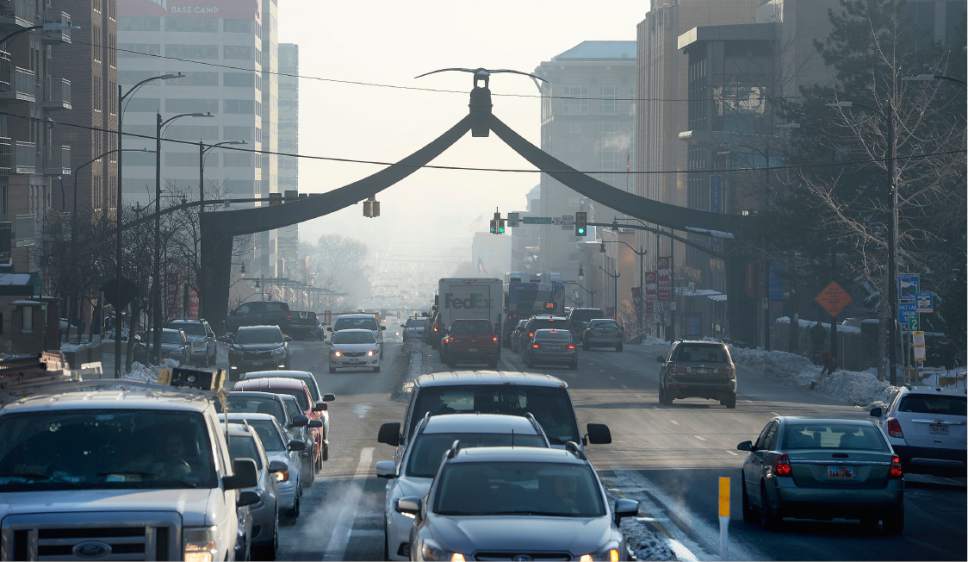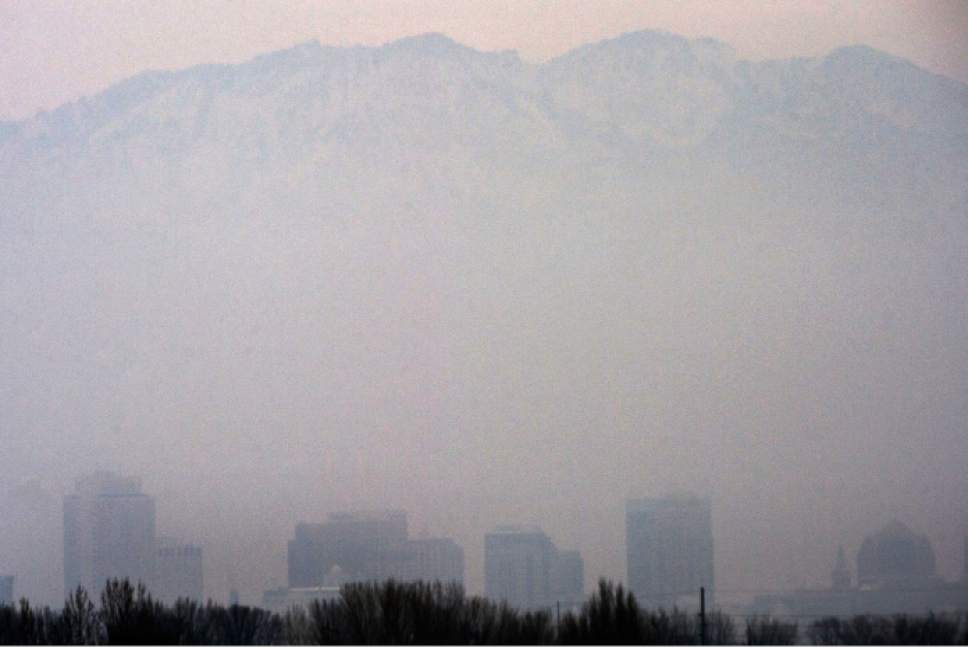This is an archived article that was published on sltrib.com in 2017, and information in the article may be outdated. It is provided only for personal research purposes and may not be reprinted.
New data from Utah's Division of Air Quality suggest Utahns are ignoring the state's mandatory no-burn days, when burning wood or other solid fuels such as coal is prohibited to protect air quality.
The findings have state officials looking for new and creative means of reinforcing the ban, but advocates say they're at a loss for ideas in light of recently passed state laws that limit the scope of potential rules.
According to state scientists, wood smoke accounts for more than 16 percent of the particulate matter in Utah's air on the average winter day.
The percentage of particulate matter coming from wood during inversions, when pollutants are prone to accumulate beneath the Wasatch Front's temperature layers, can drop to as little as 6 percent because of the increased amounts of secondary PM2.5 — small particulates that form when other chemicals interact, as opposed to particulate released directly into the air.
But scientists found that the total amount of wood smoke in the air remains about the same.
"We know some people may not be complying with the ban," said Nancy Daher, an environmental scientist with the Division of Air Quality (DAQ). But it's unclear just how widespread the problem is.
DAQ Director Bryce Bird said that when state officials launched episodic wood-burning bans, they did so assuming that 70 percent to 80 percent of Utahns would comply.
But the fact that the amount of wood smoke in the air remains unchanged when the ban is in place does not necessarily imply everyone is breaking the rules, Bird said.
For example, he said, most Utahns may be complying, but current exemptions to the rule could be producing more pollution than previously thought. So perhaps cooking with solid fuels — which is currently allowed even when a prohibition is in place — emits more pollutants than previously thought, said Bird.
Or, he conceded, it could be a compliance problem.
Regardless of the cause, Bird said, the state agency "hasn't come up with a solution yet."
Air quality advocates have long argued the DAQ needs more staff and money to enforce the ban. But that's not the issue, Bird said.
DAQ has compliance officers able to patrol for illicit wood burning, but Bird said for all the time they spent patrolling, they caught few offenders. The division now relies primarily on community complaints and health departments to catch violators, but still issues few citations.
This past winter, 12 residents were cited for violating a mandatory burn ban — one in Salt Lake County, two in Davis County, three in Cache County, and six in Utah County.
Daher noted that wood smoke data from monitoring in north Provo suggested that area has the lowest compliance rate of all the counties to which the ban applies — counties declared to be nonattainment areas that violate the U.S. Environmental Protection Agency's standards for PM2.5.
Bird said the DAQ has focused on education in hopes of boosting compliance. Few people, he said, repeat the offense once they're caught and informed of the ban.
If the state wanted to go further, Bird said, it might consider raising the penalties associated with violations, which start at $25. But outside of new enforcement steps on the current ban, state regulators have few options for curbing wood smoke.
A state law passed in 2015 prohibits regulators from enacting a broader seasonal bans on wood burning. That law was proposed after Gov. Gary Herbert suggested Utah legislators ban wood burning in seven counties during the winter. And a statute from this year's legislative session bars regulators from adopting rules related to solid fuels burned to cook food.
With those options off the table, air quality activists say they're at a loss about what to do.
"I don't really know where we can go from here," said Ashley Miller, program director for Breathe Utah. "I think they really need to look at it again ... but I know it would be kind of hopeless to try to bring another bill next session to try to undo what has already been done."
The state Air Quality Board, which had asked Herbert to veto the more recent cooking bill, hopes the governor and the bill's sponsors will keep a promise to rework the law in light of unintended consequences.
"If we have data that shows significant contributions, we have the opportunity to go back in," said Stephen Sands, the Air Quality Board's chairman.
Before he signed the bill, Herbert said that there would "be some additional work with the sponsor and others involved, the private sector as well as the Air Quality Board, to get to the right place and make sure our air quality needs are being accommodated."
A Herbert spokesman said there has been no additional discussion since the bill was signed, but that talks are expected to take place over the summer.
Traeger Grills, a Salt Lake City manufacturer of wood-fired grills that lobbied heavily for the measure during the 2017 Utah Legislature, said it has so far not been involved in any attempts to amend the law.
"We support the direction determined by the governor and the bill's sponsor," Jeremy Andrus, CEO of Traeger Grills, said in a statement. "We also support the position that every Utahn should have the decision regarding how and when they feed their families."
Meanwhile, Bird said the DAQ is working with Idaho officials to create a wood stove exchange in the Cache Valley. Residents could receive a cleaner natural gas stove if they surrendered a wood-burning appliance. Residents who don't have access to natural gas might receive a propane appliance or a new, cleaner-burning wood stove.
"Even an EPA-certified stove is still much more polluting," Bird said, "so the focus has been on the fuel change."
If the Cache Valley exchange is successful, Bird said he might seek funding to create a statewide program.
Twitter: @EmaPen





